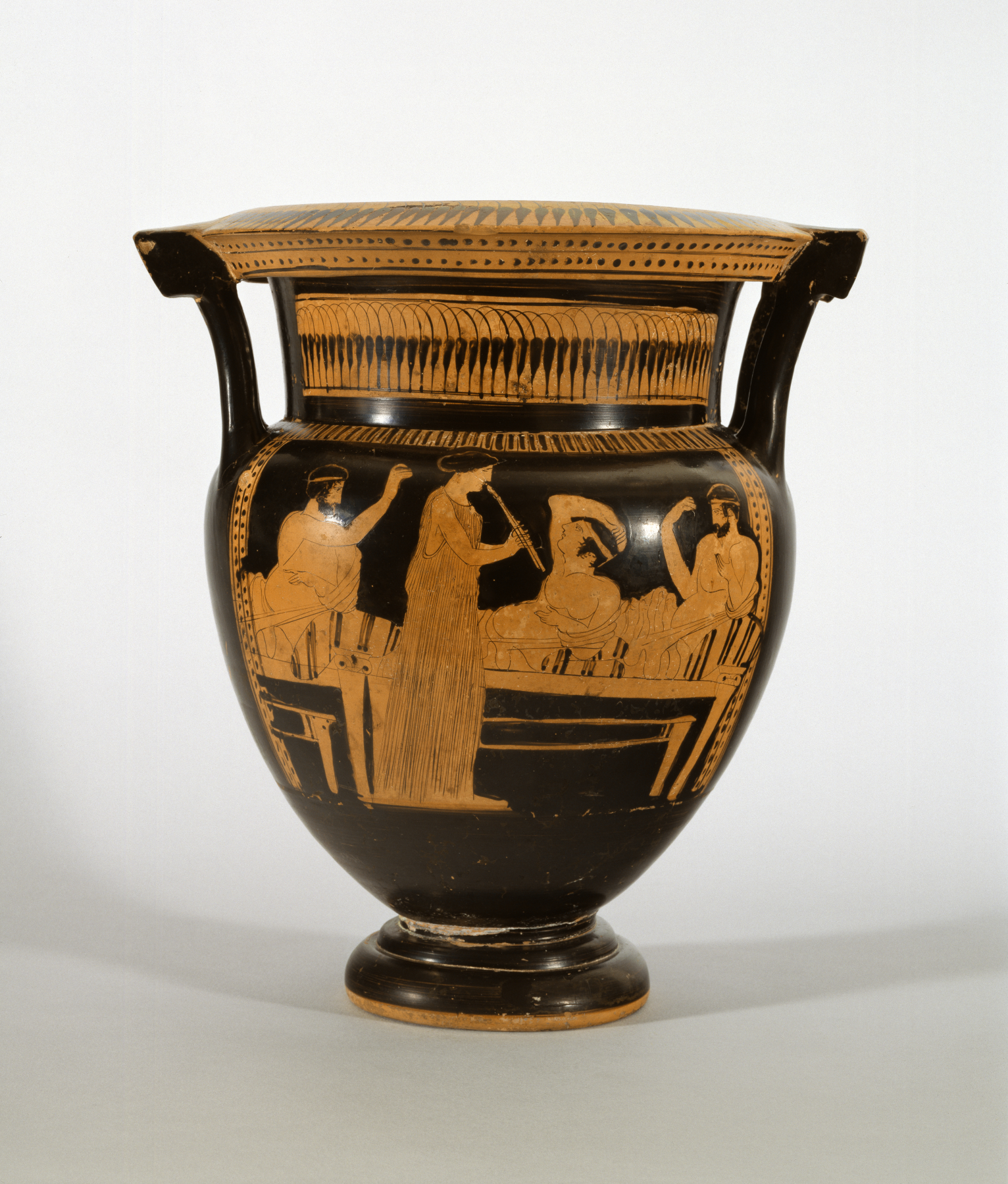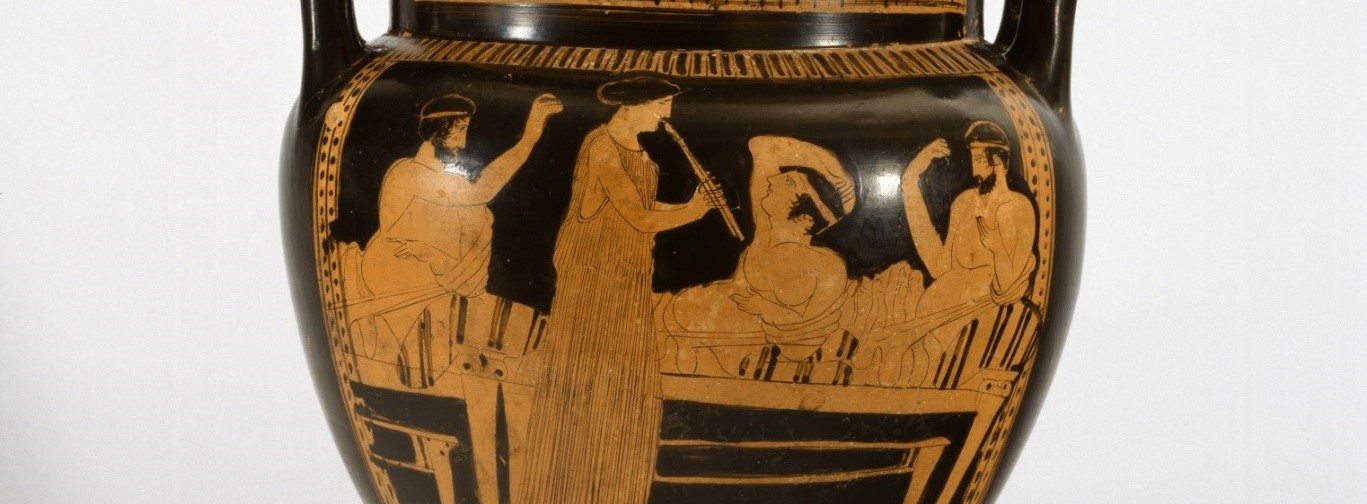John Addington Symonds frequently cites Lucian, a prolific author from the 1st century A.D (see biography below). According to his Memoirs, he first read the “erotic dialogues” of Lucian as an adolescent at the family residence of Clifton. This is the only mention of Lucian within the Memoirs. I will analyze the influence of Lucian in Symonds’ Letters and in A Problem in Greek Ethics.
In A Problem in Greek Ethics, the author mentions only Amores, also known as Affairs of the Heart or Erōtes. In Amores, Lucian wrote a dialogue comparing the difference between love for women and love for boys. Some argue this text was not written by Lucian and should, therefore, be characterized as “Pseudo Lucian,” of which fact Symonds was aware when he wrote his essay. According to James Jope, Lucian’s text received little attention from the first theorists of sexuality. John Addington Symonds is apparently one of the few people to use this text before Michel Foucault and David M. Halperin.
Symonds writes almost two pages about Amores in section XVI of A Problem in Greek Ethics, praising its comprehensive description of erotic passion. In the extracts he mentions, two characters are engaged in a discussion: Charicles defends the cause of women and Callicratides that of boys. Symonds considered the former to have had some “curiously mixed arguments”. He makes no comment on the position of Callicratides, who thinks the love of boys is a mark of sophistication. The final word is given to a third character named Theomnestus who considers that both loves are acceptable for pleasure without accepting the arguments of Callicratides.
Symonds seems to be more inclined to Callicratides’ vision. For Symonds, Lucian ultimately “support[s] a thesis of pure hedonism.” Even if Symonds refuses the ultimate conclusion of Lucian through the character of Theomnestus, he seeks to describe what he thought was one of the most important texts on the matter. Symonds wants to highlight that argumentation in favor of boy-love existed. Lucian’s texts prove that “boy-love” was a matter of debate in Ancient Greece and not necessarily seen as deviant.
Symonds also mentions Amores in section XV. In this section, Lucian describes the attitude toward marriage of one character: marriage is just a way of perpetuating mankind. In this situation, the love of males is the only true, noble love. The main idea of the extracts can be summed up in one sentence: “Let women be ciphers and be retained merely for child-bearing; but in all else away with them, and may I be rid of them.” (Amores, 38)
Symonds quotes these passages in order to illustrate the way in which people like Lucian opposed the position of Plato in the Laws. Plato argues that pleasure is only acceptable during intercourse between men and women By contrast, Lucian thinks men have a complex life, and cannot be reduced to animals simply looking to reproduce. Thus, using Lucian as an example, Symonds demonstrates that the Platonic doctrine was not highly praised by every Ancient Greek. This supports the notion that boy-love is more complicated than a simple question of tolerance or rejection.

Lucian also served as a source for Symonds in a letter where he referred to the Dialogues of the Courtesans but does not use the proper name. He refers to it as Brothel Dialogues, which is a cruder translation. Lucian wrote Dialogues of the Courtesan as a series of comedy sketches about the life of prostitutes. The picture on the left illustrates the kind of activities prostitutes performed. It shows a symposium that includes both a female prostitute playing music (hetairai) and a young male recognizable by his lack of beard.
The letter written by Symonds is addressed to Havelock Ellis and dated from 1892. Ellis was an English physician and a pioneer in sexology who would later co-author Sexual Inversion with Symonds. A Problem in Greek Ethics came to be part of Sexual Inversion, and the letter is about the general organization of this book.
In this letter, Symonds broadly summarizes the thesis of A Problem in Greek Ethics, which he frequently refers to as “My Problem.” He quotes Strato, Plato, and Lucian as basic references on the question of ancient conceptions of sex. He emphasizes that Ancient Greeks were not shocked by relationships between men because they were often attracted to both males and females. He also uses Lucian’s dialogues to describe “female Sexual Inversion”. Symonds stresses the lack of historical information on the topic. This question is not really treated in A Problem in Greek Ethics, in which Symonds focuses on men. It seems important to point out that Lucian would indeed be used later by scholars such as Kenneth J. Dover. Symonds already pointed out Lucian’s importance in the 19th century.
In conclusion, Lucian’s writings had a crucial impact on the thinking of John Addington Symonds. Using the debate between Charicles and Callicratides he proved that paiderastia was debated and could be associated with positive values. He also mentioned Lucian as a promising lead to explain love between women. Overall, these texts enable him to consider sexual relations in Ancient Greece with a comprehensive and nuanced approach making A Problem in Greek Ethics a major essay on the matter.

Some information about Lucian:
Lucian’s life is not fully described. What little information we have on him comes from his own works, which are not always reliable. Lucian was born around 120 A.D. in present-day Turkey and he died in Athens around 180 A.D. He was a rhetorician and a writer established in Athens. He is well-known for his satirical commentaries on the life of Greeks in the Classical (423-323 B.C.) and Hellenistic (323-30 B.C.) periods. A lot of his works have survived for centuries because of their popularity among Romans.
Works Cited and useful links
A complete translation of the works of Lucian can be found on public domain thanks to the University of Adelaide (follow the link)
Blondell, Ruby & Boehringer, Sandra. “Revenge of the Hetairistria: The Reception of Plato’s Symposium in Lucian’s Fifth Dialogue of the Courtesans.” Arethusa, vol. 47 no. 2, 2014, pp. 231-264. (not open access)
Jope, James. “Interpretation and Authenticity of the Lucianic Erotes.” Helios, vol. 38, no. 1, 2011, pp. 103–120. (not open access)
Regis, Amber K. The Memoirs of John Addington Symonds: A Critical Edition. London: Palgrave Macmillan UK , 2016.
Symonds, John Addington. A Problem In Modern Ethics: Being an Inquiry Into the Phenomenon of Sexual Inversion. London, 1896.
Symonds, John Addington, and Horatio F Brown. Letters and Papers of John Addington Symonds. New York: C. Scribner’s Sons, 1923.

